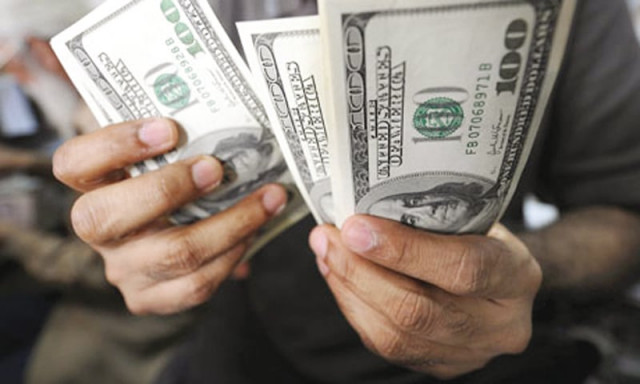Pakistan borrows $2.5b from global capital markets
10-year Eurobond bond offered in the low 7% range and 5-year Sukuk at an initial price tag of 6%

PHOTO: AFP
The dollar-denominated Eurobond and Sukuk Al-Ijarah fetched the highest-ever amount for Pakistan in a single such attempt abroad.
Surprisingly, Pakistan got a better price and a better deal size despite difficult domestic situation.
The $2.5 billion injection would provide a breathing space to the government which is reluctant to go back to the International Monetary Fund (IMF) ahead of the next general elections.
Govt likely to raise only $1.5b through Eurubonds, sukuk issuance
The excessive liquidity in the international market and low-interest environment also helped the government strike a better deal.
Pakistan got around $8 billion offers for both Sukuk and Eurobond, allowing the country to get the best deal. The outcome of the deal beat expectations of both the government and market analysts, as there were fears that investors might strike a higher price because of the prevailing political uncertainty and the country’s huge financing needs.
The deal was signed off at rates which were even lower than indicative rates Pakistan offered to global investors. Pakistan offered the 10-year Eurobond bond in the low 7% range and the 5-year Sukuk at an initial price tag of 6%.
The government raised $1 billion through the 5-year Sukuk at the rate of 5.625%, which near lowest-ever rate of 5.5% that Pakistan paid in September last year.
The rest of $1.5 billion were generated through the 10-year Eurobond at a fixed rate of 6.875%, which is 455 basis points above the corresponding 10-year US Treasury benchmark rate, matching the lowest-ever rate of 6.875% that Pakistan paid in 2007 on its 10-year Eurobond.
The government shelved its plan to issue a 30-year Eurobond after a gap of 12 years, encountering difficulties at fetching a better price.
A team comprising Special Assistant to the Prime Minister on Economic Affairs Dr Miftah Ismail, Secretary Finance Shahid Mahmood and the Governor State Bank of Pakistan (SBP) held road shows in the UAE, the UK and the US.
The Third Pakistan International Sukuk Company issued the Sukuk Al-Ijarah, pledging a section of Pakistan Motorways as collateral.
Both the bonds will be listed at the Luxembourg Stock Exchange under the US Regulations.
The country is forced to tap global debt markets after the federal government failed to ensure sufficient non-debt creating inflows. Domestic exports plunged 25% over the past four years, standing at mere $20.4 billion, or just 6.7% of the $304 billion national economy. Foreign direct investments also remained miserably low.
In order to meet forex requirements, the PML-N government has so far raised a whopping $13.7 billion by floating bonds and obtaining commercial loans over the past four and a half years. These include $6.64 billion expensive foreign commercial loans and $7 billion Sukuk and Eurobond notes, including the fresh deal.
Cabinet allows $3b borrowing through Sukuk, Eurobonds
The consortiums of banks hired for the transactions had indicated that the 5-year Sukuk, the 10-year Eurobond and another 30-year Eurobond with combined proceeds of between $2 and $3 billion could be floated.
Pakistan went to the international debt markets to bolster the central bank’s fast depleting foreign exchange reserves. Earlier, the government borrowed $2 billion in 2014 through similar capital market transactions.
The central bank’s official foreign currency reserves depleted to $13.54 billion because of mounting trade and debt-related payments.
The domestic current account deficit widened to more than $5 billion in the July-October period of the ongoing fiscal year – higher by almost 122% in comparison with the same period during the previous fiscal.
Earlier this month, the federal cabinet allowed borrowing of $2 billion to $3 billion from international debt markets by floating sovereign bonds, waiving a dozen taxes to make deals more attractive for investors.
A consortium, comprising the Standard Chartered Bank, Industrial and Commercial Bank of China, Citibank, Deutsche Bank, Dubai Islamic Bank and Noor Bank handled the Sukuk transaction.
The Standard Chartered Bank, Industrial and Commercial Bank of China, Citibank and Deutsche Bank were lead managers for the Eurobond issue.



















COMMENTS
Comments are moderated and generally will be posted if they are on-topic and not abusive.
For more information, please see our Comments FAQ